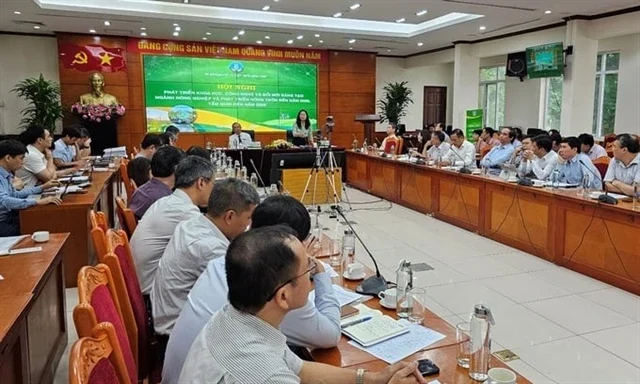Hanoi: Science, technology and innovation play an increasingly important role in agricultural growth, according to Phung Duc Tien, Deputy Mminister of Agriculture and Rural Development.
Research showed that technological innovation can contribute significantly to the growth of the agriculture, forestry and fisheries sectors, helping achieve target increases of more than 50%, Tien said at a conference on ccientific and technological development and innovation in agriculture and rural development held by the Ministry of Agriculture and Rural Development (MARD) on May 20 in Hanoi.
He said this shows that Vietnamese agriculture is shifting from a breadth-based model to an in-depth growth model based on science, technology and innovation.
Innovation has helped improve livestock breeds and increase crop and livestock productivity.
The scientific community has recently recognised 529 new types of crops and livestock, including 393 crop varieties as well as 12 aquatic breeds, 82 forestry varieties and 42 livestock breeds.
The work of selecting, breeding and producing seed has been highly effective, contributing significantly to the productivity and quality of agriculture.
New technology has also helped to promote mechanisation and labour productivity in agriculture and related industries.
Scientific applications have had a large impact on key goods at both the national and provincial levels, including seed production, farming, and processing of marine products like shrimp and catfish.
Many large-scale Vietnamese enterprises are already using advanced global technology. These include TH dairy company, Dabaco in livestock, Nafoods fruit growing and processing company, and Masan Group in the meat processing industry.
However, there are limitations in the field of science and technology, such as the slow commercialisation and application of research results, lack of a strong scientific research workforce, and poor equipment and facilities for research, the deputy minister said.
At the conference, delegates from research institutes, the School of Agriculture and Rural Development Personnel Management, the Centre for Digital Transformation and Agricultural Statistics, and the National Agricultural Extension Centre discussed innovative thinking and policies for the development of technological innovation in the agricultural and rural development sector until 2030. Other topics of discussion included training human resources and using science and technology in agricultural extension work.


